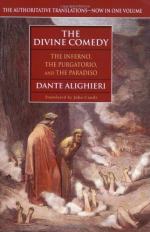But as it chances, if one sort of food
Hath satiated, and of another still
The appetite remains, that this is ask’d,
And thanks for that return’d; e’en so
did I
In word and motion, bent from her to learn
What web it was, through which she had not drawn
The shuttle to its point. She thus began:
“Exalted worth and perfectness of life
The Lady higher up enshrine in heaven,
By whose pure laws upon your nether earth
The robe and veil they wear, to that intent,
That e’en till death they may keep watch or
sleep
With their great bridegroom, who accepts each vow,
Which to his gracious pleasure love conforms.
from the world, to follow her, when young
Escap’d; and, in her vesture mantling me,
Made promise of the way her sect enjoins.
Thereafter men, for ill than good more apt,
Forth snatch’d me from the pleasant cloister’s
pale.
God knows how after that my life was fram’d.
This other splendid shape, which thou beholdst
At my right side, burning with all the light
Of this our orb, what of myself I tell
May to herself apply. From her, like me
A sister, with like violence were torn
The saintly folds, that shaded her fair brows.
E’en when she to the world again was brought
In spite of her own will and better wont,
Yet not for that the bosom’s inward veil
Did she renounce. This is the luminary
Of mighty Constance, who from that loud blast,
Which blew the second over Suabia’s realm,
That power produc’d, which was the third and
last.”
She ceas’d from further talk, and then began
“Ave Maria” singing, and with that song
Vanish’d, as heavy substance through deep wave.
Mine eye, that far as it was capable,
Pursued her, when in dimness she was lost,
Turn’d to the mark where greater want impell’d,
And bent on Beatrice all its gaze.
But she as light’ning beam’d upon my looks:
So that the sight sustain’d it not at first.
Whence I to question her became less prompt.
CANTO IV
Between two kinds of food, both equally
Remote and tempting, first a man might die
Of hunger, ere he one could freely choose.
E’en so would stand a lamb between the maw
Of two fierce wolves, in dread of both alike:
E’en so between two deer a dog would stand,
Wherefore, if I was silent, fault nor praise
I to myself impute, by equal doubts
Held in suspense, since of necessity
It happen’d. Silent was I, yet desire
Was painted in my looks; and thus I spake
My wish more earnestly than language could.
As Daniel, when the haughty king he freed
From ire, that spurr’d him on to deeds unjust
And violent; so look’d Beatrice then.
“Well I discern,” she thus her words address’d,
“How contrary desires each way constrain thee,
So that thy anxious thought is in itself
Bound up and stifled, nor breathes freely forth.
Thou arguest; if the good intent remain;
What reason that another’s violence
Should stint the measure of my fair desert?




